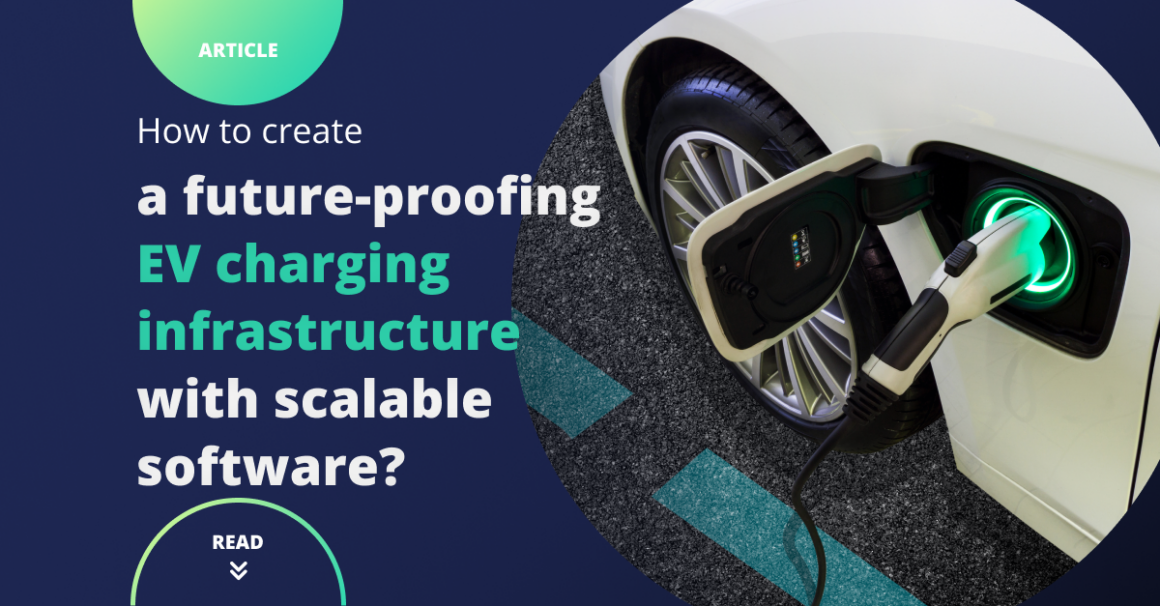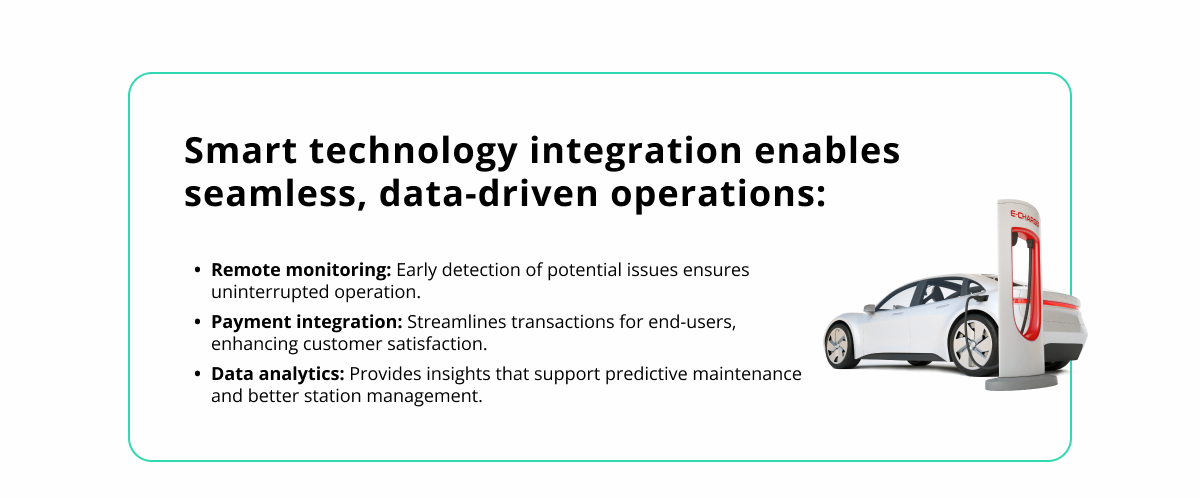How to create a future-proofing EV charging infrastructure with scalable software?

As electric vehicles (EVs) surge in popularity, the demand for an expansive and reliable charging infrastructure has become a priority. Both governments and private companies are investing heavily to build robust fast-charging networks to accommodate the rapidly growing consumer base. However, a range of challenges such as regulatory hurdles, grid capacity limitations, and high deployment costs pose significant bottlenecks that could impede this growth. Codibly’s expertise in scalable software solutions can play a transformative role in addressing these challenges, enabling a more efficient rollout and operation of charging stations.
Expanding and optimizing EV charging infrastructure
The rapid increase in EV adoption necessitates a correspondingly swift expansion in EV infrastructure – especially EV charging infrastructure. However, this expansion is not without its challenges. Regulatory processes often slow down the installation of new charging stations due to complex permitting requirements. At the same time, the existing electrical grids in many areas, especially urban centers, need substantial upgrades to handle the increased load from EV chargers. These grid upgrades are expensive and time-consuming but are essential for avoiding outages and ensuring reliable service as the number of EVs continues to rise. Furthermore, the infrastructure for fast charging, which is critical for making EVs as convenient as traditional cars, involves substantial costs. According to McKinsey & Company, a typical 350-kilowatt charger can cost upwards of $150,000, including hardware, installation, and planning.
Current challenges in EV charging infrastructure
Charging infrastructure faces significant challenges that must be addressed to accommodate the growing number of electric vehicles:
- Regulations and permitting: Regulatory approval processes can delay installations significantly. Building permits often involve numerous agencies and intricate requirements, which makes acquiring them time-consuming and challenging. These delays slow down the development of charging stations and frustrate stakeholders aiming to meet EV adoption targets.
- Grid limitations: Many existing electrical grids struggle to handle the increased load caused by EV chargers, especially in high-density urban centers. These grids need substantial upgrades to expand capacity and prevent overloading. This challenge is exacerbated by high infrastructure costs and requires strategic investments to accommodate the rising demand for charging.
- Resource shortages: The EV industry is growing rapidly, but the number of skilled technicians and availability of specialized equipment is lagging. The scarcity of trained labor, fast-charging hardware, and installation equipment impedes network scalability, limiting operators’ ability to expand efficiently.
- Infrastructure costs: Fast chargers often exceed $150,000 per unit, including planning, installation, and hardware. This high price is a significant barrier for operators aiming to build extensive networks, as they struggle to balance short-term expenses with long-term profitability.
These obstacles collectively emphasize the importance of adaptable and scalable solutions that can streamline regulatory processes, optimize grid usage, and reduce the overall cost burden on operators.
Scalability and flexibility in future-proofing solutions
To ensure that EV charging infrastructure can keep pace with technological advancements and increasing demand, it must be designed with scalability and flexibility in mind. This involves deploying modular charging stations that can be easily upgraded as needed without extensive modifications. It also means integrating intelligent load management systems that can dynamically adjust power distribution based on real-time demand, thus optimizing the use of available resources and preventing overloads. Such systems use advanced data analytics to forecast demand patterns and adjust operations accordingly, ensuring charging stations operate efficiently and reliably.
The role of software in managing of EV charging infrastructure
In the fast-evolving world of EV infrastructure, sophisticated software is crucial for real-time monitoring, management, and scalability. Here’s how software ensures efficient operations and supports the rapid expansion of charging networks:
- Real-time monitoring and management: Monitoring software identifies issues promptly, reducing downtime and ensuring seamless operations. Codibly’s software, for instance, allows Charging Point Operators (CPOs) to detect, report, and resolve technical problems quickly while gathering data on station usage patterns.
- Standards compliance and interoperability: Compliance with standards like OCPP 2.0.1 allows charging stations to communicate with various EV Charger models and infrastructure components. Codibly ensures that their software solutions remain compliant with emerging standards, ensuring seamless communication and compatibility between different manufacturers and station networks.
- Open-source software and system standardization: Open-source software offers flexibility and the ability to standardize across charging networks. Codibly’s solutions incorporate this adaptability, allowing charging stations to adopt modular designs that can be easily updated. This standardization simplifies maintenance, reduces long-term costs, and enables quick system-wide updates.
- Data analytics for predictive maintenance: Advanced data analytics can forecast demand patterns and optimize maintenance schedules. Codibly integrates data-driven analytics that helps CPOs preemptively identify potential problems, optimize grid loads, and ensure efficient operations.
- Load management and smart energy integration: Codibly’s solutions help dynamically adjust power distribution, optimize resource use, and prevent grid overloads. Their platform supports the integration of renewable energy sources and battery storage, contributing to a balanced, sustainable charging network.
Adopting open-source software and standardizing systems across the charging network can further enhance compatibility and ease of maintenance, reducing long-term costs and facilitating quicker updates across the system (S44 Digital).
Integrating smart technologies and renewable energy

Smart technologies are integral to modern EV charging infrastructure. Features such as remote monitoring, integrated payment systems, and user-friendly mobile apps enhance the charging experience and allow station operators to gather valuable data on usage patterns. This data can be used to optimize charging schedules, predict maintenance needs, and improve overall service quality. Moreover, the integration of renewable energy sources, such as solar panels or wind turbines, with charging stations is becoming increasingly important as the push for sustainability grows. These green technologies can offset some of the energy demands from the grid, contributing to a lower carbon footprint for the EV sector.
Partnership that matters in the EV ecosystem
Effective collaboration among various stakeholders—government agencies, utility companies, EV manufacturers, and charging infrastructure providers—is essential for the successful expansion of EV charging networks. These partnerships help align the goals and resources of each participant, ensuring that infrastructure development is coordinated and meets the needs of all parties involved. Codibly, with its deep expertise in scalable software solutions for the energy sector, can provide crucial support in these collaborations. By offering customized software solutions that facilitate integration, management, and scalability, Codibly helps its partners navigate the complexities of infrastructure expansion while optimizing performance and cost-efficiency.
The transition to electric vehicles is an integral part of the global shift towards more sustainable modes of transportation. By implementing scalable, flexible, and intelligent infrastructure solutions, stakeholders can ensure that the growth of the EV market is supported by a robust and efficient EV charging infrastructure. Partner’s expertise as Codibly in software development positions it as a key player in this transformation, enabling Charging Point Operators to overcome the technological and regulatory challenges of today and prepare for the demands of tomorrow.
Interested in learning more or need help implementing software solutions for the EV infrastructure?
contact us
Need expert guidance on your next energy project?
Reach out to us and discover how Codibly can offer tailored solutions to drive your business.